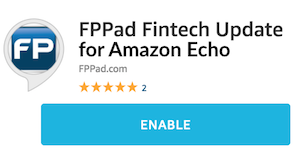Podcast: Play in new window | Download | Embed
Subscribe: RSS
In this week’s top advisor technology stories:
- Starburst Labs, the creators of Wealthbox CRM, raised $6.25 million in new capital
- The XY Planning Network inks an enterprise pricing deal with eMoney Advisor
- Morgan Stanley pays a $13 million settlement for billing mistakes across 149,000 customer accounts, and
- Document management provider Cabinet Paperless gets acquired by PSIGEN Software
Starburst Labs raises $6.25 million in new capital
This week, Starburst Labs, which is the New York City-based company (formerly known as Gotham Tech Labs) that makes Wealthbox CRM, announced it raised $6.25 million in Series A funding. Back in December when the Financial Planning Magazine technology survey came out, Wealthbox CRM was one of the few movers and shakers in that survey who rose up the ranks in overall adoption. Most of the other companies basically stayed in the same positions as in previous surveys.
So Wealthbox CRM basically launched from zero on February 11th 2014 (which I remember because February 11th is my birthday) and in under three years has ascended to the level of industry adoption to compete with well-known CRMs like Redtail, Salesforce, and Junxure.
What’s interesting, though, is that Starburst has three other products in addition to Wealthbox CRM which are InvestorSay, an online community centered around investing ideas, PaperTrade.io, a plugin for simulated stock trading contests, and Wealthbase, a question and answer website that reminds me a lot of Quora.
So the Series A funding won’t exclusively support Wealthbox CRM, because I’m sure it’ll be allocated across all four products, but at least the new investment will do more than just keep the lights on at Starburst’s SoHo offices. Now, they don’t have a personal chef on site, but the offices are more than adequate to support the work the team needs to get done.
And don’t forget, Wealthbox CRM is included in the technology package for anyone who is a member of the XY Planning Network, which is growing at its own eye-opening pace, so I’m not at all concerned that the product might go away anytime soon. An acquisition is a whole other story, but that’s a risk you take with any independent technology provider you use in your business, and isn’t a risk that’s exclusive to Wealthbox CRM.
So with that, let me just say that I believe Wealthbox CRM deserves a little more respect and recognition in the industry for the adoption it has already earned among advisors in just a few years.
The XY Planning Network inks pricing deal with eMoney Advisor
Speaking of XY Planning Network, they’re also in the news this week after announcing a partnership with eMoney Advisor, where members of the network will receive enterprise pricing to emX Pro.
emX pro is the top of the line package that offers planning modules for cash flow, estate, investment, and retirement illustrations above and beyond the client portal and account aggregation in the less expensive tiers.
Retail pricing for emX pro is around $3800 a year, so enterprise pricing probably knocks off 10 to 20 percent, but it doesn’t bring the price down to the $1000 a year range for planning software like MoneyGuidePro and inStream that offer pricing discounts to XYPN members.
Morgan Stanley pays a $13 million settlement for billing mistakes
I have two more quick stories worth mentioning: First, I saw that Morgan Stanley was ordered to pay $13 million to settle civil charges brought by the SEC after the Commission found that more than 149,000 clients were charged excess fees of more than $16 million between 2002 and 2016 as the result of billing errors. The firm also failed to comply with custody rules by not conducting surprise audits on client accounts for which the firm had custody.
So accurate billing is one of those things than often goes under appreciated inside your advisory business. If you have robust portfolio accounting systems like Orion, Envestnet | Tamarac, Advent, AssetBook, and others, it’s probably built in and pretty seamless. But I know some firms still calculate fees using custom Excel spreadsheets, and if that’s you, this action against Morgan Stanley should be a reminder for you that it’s probably time to replace your Excel spreadsheets with a more robust and less error-prone accounting system.
Cabinet Paperless gets acquired by PSIGEN Software
And to wrap up advisor technology news, I saw that Cabinet Paperless, a document management company based in Huntsville, Alabama, was acquired by PSIGEN Software for an undisclosed amount. PSIGEN offers document scanning and capture technology, and it’s safe to say that once you capture a document electronically, you’ll need a good solution to index, store, and archive all that information, hence the acquisition of Cabinet.
Someone challenged me last week about why I think advisers are behind on technology adoption, and when I think of document management, this one of the solutions where I think I’m correct in that a minority of advisors have purchased and implemented a robust solution here. Your top contenders here are Laserfiche, Cabinet, NetDocuments, and possibly Sharepoint if you can justify the cost and customization required to make it work right in your firm.
Soapbox: Incremental Care > Acute Care
So moving on, I didn’t come across any cool or disconcerting apps this week to share, so i’ll get right to the soapbox to wrap up this week’s update.
Sometime in the next few days, I hope you’ll take about 20 to 25 minutes to read an essay in the New Yorker by Dr. Atul Gawande about incremental care, or primary care, and the differences and tradeoffs of that kind of physician interaction compared to acute care, or the interaction one might receive from a specialist.
Yes, there are some connections with health insurance and health insurance , but this essay helped me set aside my own political believes and consider what I want from my long-term healthcare interactions.
I’m one of the fortunate ones; my wife works for a big employer that offers a high deductible plan with subsidized premiums and very good coverage. I try not to loose sight of how much of a privilege it is not to have to worry each year about our family’s coverage. But that’s not true for millions of americans nationwide. And I’m sure many of your clients, especially your small business owners, spend a lot of time each year evaluating some very difficult choices around the coverage for their employees, as well as coverage for their own household. Many of you, as owners of independent RIAs, are in the same boat.
So that’s why this essay was a compelling read for me. It was worth 25 minutes of my time, and I hope you’ll find it’s worth your time, too.
I’ve linked to all of this week’s featured stories over on my website, so be sure to check them out over at fppad.com/203
And that wraps up this week’s broadcast on the best in advisor technology and more. If you have something to say, or have a story you think should be featured in a future episode, please send me a tweet on Twitter, I’m @billwinterberg, or if you’re not already receiving my email newsletter, you can sign up at fppad.com/subscribe
Thank you so much for *reading*, I’m Bill Winterberg, see you next time.





